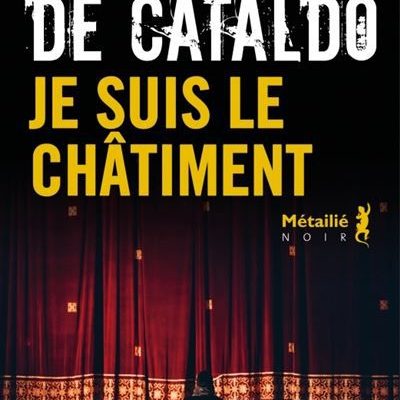I am the punishment
By Giancarlo De Cataldo, trans. from Italian by Anne Echenoz, Métailié editions, 240 p., €20.50.
The rating of L’Express: 4/5
He is impressive, this Giancarlo De Cataldo, all at the same time playwright, essayist, screenwriter, documentary filmmaker, great novelist of the underworld (Romanzo criminale in 2002, The Season of Killings in 2007, Suburra in 2013) and magistrate. If at the age of 67, the Italian had to put away his robe as a judge of the Roman Assize Court, he is not about to orphan his thousands of readers. Better, he harpoons them with a new and superb character, the elegant assistant public prosecutor in Rome Manrico Spinori, whose adventures he intends to multiply in the future. Crazy lover of opera (an inexhaustible source of lessons on human passions), son of penniless nobility (his mother is an inveterate gambler), considerate and prudent gentleman, the “little count” Manrico is entrusted with a business which, from mundane appearance quickly becomes explosive: Mario Brans (stage name of Stefano Diotallevi), an idol crooner of the 1960s and 1970s turned recording industry mogul, is killed in a car accident, while his driver is emerges miraculously.
Problem: the brake fluid supply pipe has been severed. The press is at bay. Supported by a trio of inspectors, the prosecutor, pressed by his superior, pursues an increasingly thorny investigation as the putative culprits multiply: wife (the second), son, rapper, dealer… All have a good reason to kill someone who turns out to be a dirty guy who loves young girls and drugs. With a keen sense of suspense and human psychology, De Cataldo grips us until the last page.
The Alice Crimmins Case
By Anaïs Renevier, 10/18, 192 p., €7.50.
Express rating: 4/5
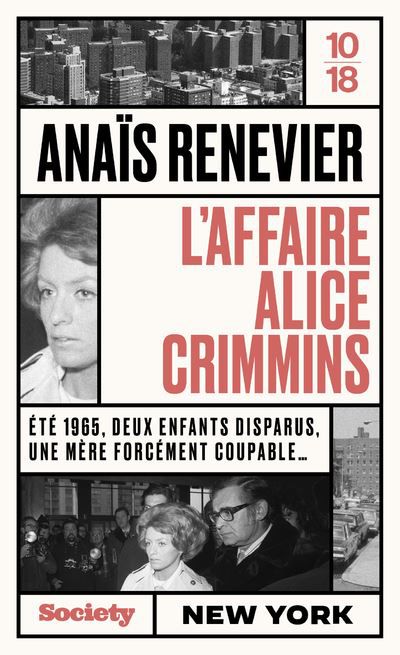
Behind this book, a new collection in pocket format launched by the publisher 10/18: the United States through their criminal affairs, a story by State, written by the journalists of the magazine Society returned to the scene. The first two issues are devoted to The Case of the Golden State Killer (by William Thorp), or the hunt for an elusive rapist/murderer in California in the 1970s and 1980s, which found its epilogue in 2018; and at this Alice Crimmins case, breathtaking perspective of a drama that fascinated the country more than half a century ago.
It all started on July 14, 1965 in Queens, New York, with the disappearance of the two young children of Alice Crimmins, a woman in divorce proceedings, separated from her husband. The personality of Crimmins immediately disturbs the investigators: not enough grief, too much charm, and above all, too many love affairs. His case worsens when the bodies of his daughter and then of his son are found in vacant lots in the neighborhood: the investigators, all men, of Catholic culture, are convinced that the mother has something to do with it. The judicial machine is carried away and it will go far, terribly, until a double trial which is above all that of the morals of a young woman thrown into food in a moralistic and voyeuristic America. Anaïs Renevier has found some of the protagonists of the story, explores the leads left by the police, and seizes with an alert pen the air of an era in a finely constructed story that can be read in one go.
Agent Seventeen
By John Brownlow, trans. from English (United States) by Laurent Boscq, Gallimard, 512 p., €23.
The rating of L’Express: 4/5
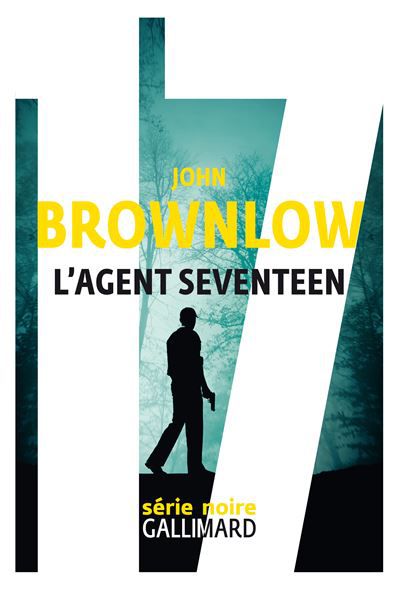
With this Agent SeventeenJohn Brownlow signs a first novel as tasty as a good James Bond. The action, the mystery, the rhythm, the characters to which we attach ourselves, nothing is missing in these 500 pages that we finish during a rainy weekend. All accompanied by a starting presupposition that completely renews the genre. The adventure takes place, in fact, in the ruthless world of contract killers of international stature, where 17 – a nod (almost too) obvious to 007 – replaces 16 by killing him and where he himself can from day to next day to be eliminated by 18. Agent Seventeen is therefore on a mission to Berlin to slay an old man. No sooner has he reached his target than he is sent on a new task which turns out to be a trap. His life is now in danger. Back in the United States, he will fight to get by.
All of John Brownlow’s talent lies in his ability to mix genres. Agent Seventeen is unquestionably an action book with enough car chases and shootings to keep the reader going, but it is laced with (dark) humor that eases the pressure. Here is without hesitation a thriller set in a world where powerful beings surpass the States, but where the hero remains a sensitive being, attached to those he loves. And that is perhaps what makes it strong in the face of the cynicism and manipulation of the camp opposite. We won’t tell you if that’s enough to save him. But don’t worry, with or without Agent 17, a new opus is already being written.
If the gesture is beautiful
By Benjamin Franceschetti, La Manufacture de livres, 416 P., €21.90.
The rating of L’Express: 3/5
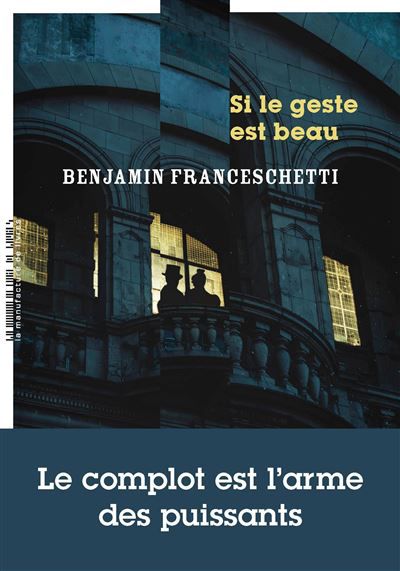
La Manufacture de livres continues the path opened with Gwenaël Bulteau and publishes a new high-quality historical thriller. In If the gesture is beautiful by Benjamin Franceschetti, it is the immediate pre-war period of 1914 and its convulsions that we explore, between police investigation, espionage and political book. The novel begins with what appears to be a series of bombings by a group of anarchists intent on pressuring the government to secure the release of one of their relatives. The very traditional commissioner Fabre investigates the old fashioned way and a young, slightly naive journalist hopes to boost his career by following this case.
Very quickly, however, appearances fade into a thick fog where spies swarm. Who works for Germany? Russia ? Great Britain ? Within the French police forces themselves, why do so many agents behave strangely? Not to mention the political camps, those of Poincaré, Caillaux or Calmette, the director of Figaro. Double, triple, provocative agents, you have to hang on to the beginning to spot who is who in this thick maquis. But when the pawns fall into place, the story turns out to be fascinating. And very instructive. The author reminds us at the end: a few months later, several of the protagonists of this war before its time will die in the trenches, one, of a leg torn off by a shell, another, the entrails open. The idealism of the anarchists will then appear quite ridiculous and the cynicism of the others even more cruel.
The edge
By Niko Tackyan. Calmann-Lévy, 324 pages, €19.90.
The rating of L’Express: 3/5
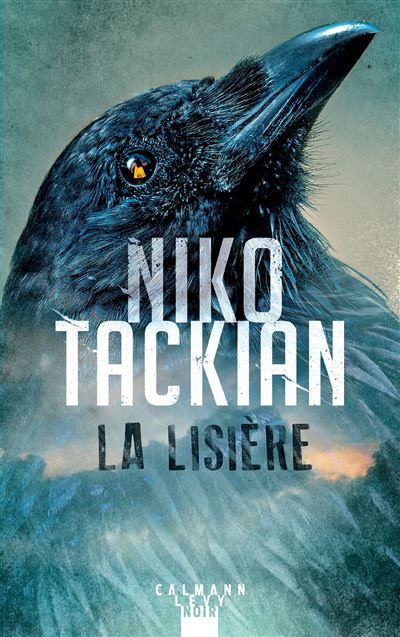
Unquestionably, the places inspire the Parisian. But just reading the titles of Niko Tackian, Avalanche hotel, Loneliness, Breathe, up to this Edge, it is easy to understand that this lover of wide open spaces and raw nature has less and less appetite for asphalt and cobblestones. After the Vercors and an island full of pines and dunes, here are the Monts d’Arrée. A country, in the heart of Finistère, not to put a car outside. This is what Vivian Legoff understands one evening, leaving Morlaix with her husband Hadrien, entrepreneur and their son Tom to go to her mother-in-law’s house, near Quimper. While crossing the granite and peat massif, Hadrien brakes sharply to avoid a black dog. Then goes out to check the tires, followed by Tom gone to relieve himself. She will never see them again. Soon chased by a man holding an axe, she flees.
Then begins the investigation, as foggy as this Armorican land bathed in Arthurian writings and Druidic mystical legends. Lieutenant Maëlys Mons, of the Carhaix-Plouguer brigade, struggles in vain, father and son are nowhere to be found. For her part, Vivian discovers a message left in her photo gallery by a mysterious Lorie and sees her son tirelessly in her dreams. Each awakening is a nightmare… Despite her reluctance, she gets help from a psychiatrist, living in a strange mansion. Everything is unusual here, moreover, under the bewitching pen of Niko Tackian, passionate about sleep and the land of dreams: these Arrée mountains, Vivian’s past, Hadrian’s personality, up to the resolution of the case, at the very end of the book…
From woman to woman
By Helene Couturier. Shores/Black, 188 p., €19.
The rating of L’Express: 4/5
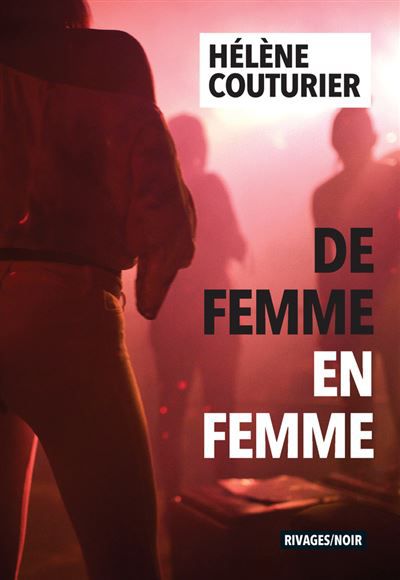
Neither Arab nor Jewish: Ilyas, 39 years old, 1.84 meters, a hundred kilos, krav maga teacher, makes it a point of honor to specify that he is Kabyle, not Muslim on top of that. Especially to women whom this bachelor never tires of flirting with on weekends in Parisian nightclubs. Sex without a future – not without consideration – is his thing. Dancing, her “strong point”, which, that evening, a certain Elodie, a little brunette with “incredible buttocks that she swings in an equally incredible way”, could not resist. Prompt to invite Ilyas to her home, the thirty-year-old turns out to be a strong-headed, narcotics cop, and their antics seem to get out of hand. But how much? The swarthy “big guy” doesn’t remember anything…
Sacred character that this endearing narrator, unclassifiable, strong and weak, good and nerd, fond of French song – from Dalila to Juliette Armanet via Balavoine and Luna Parker – and for whom “the slut is just a concept of a guy who wants to keep sexual power!” If his raw monologue recounts his adventures from one woman to another before landing in prison, this same weekend, he also dwells on his obsessions: Ilyas has rage, abused as a child by a tyrannical father whom he only names ” l’Enfoiré” and that he cannot bear to see his beloved mother enslaved for so long, in the name of a depraved Islam. First French author published in the legendary Rivages/Noir collection in 1996 with son of a woman (which reappears in paperback), Hélène Couturier revives the thriller of a writing that is still just as free: atypical noir novel, From woman to woman carries the pen in the wounds of the past, the complexity of the present, the vagaries of desire. Between violence and tenderness, loneliness and solidarity, madness and fantasy, he certainly takes to the guts.
